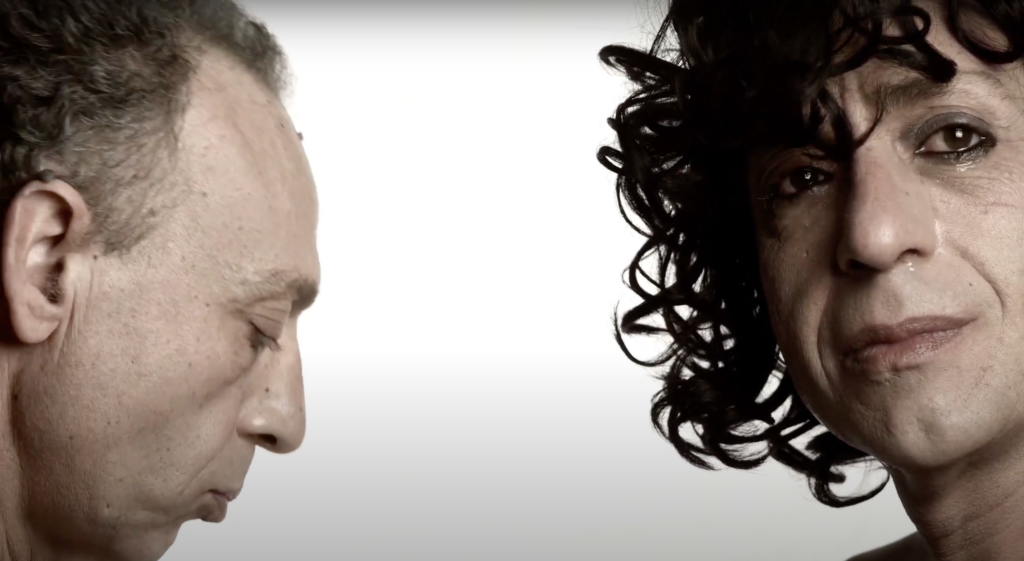An autobiographical documentary film by a transgender person

Petra/Piero, a Gender-fluid Trans Fem. person, begins to recover from drug addiction when at the age of forty-five they confront and let the feminine side of their gender identity emerge. Petra/Piero has recently started the process of hormone therapy and keeps on documenting their experience, transition and the multiple ways in which their body, and way of being into the world, change. This process is facilitated by their relationship with artist and film director Cristina Nuñez and her method SPEX, an artistic dispositive for individual and social transformation.
Piero is also Petra and from a very young age they feel a deep connection with their feminine side. Because of their inability to understand themselves and their fear of being considered as an ambiguous subject, they manifest a severe drug addiction and depression, which ultimately leads them to seek help.
In the Summer of 2017 they met Cristina Nuñez, an artist and photographer who through the Self-Portrait Experience (SPEX) dispositive and two online SPEX workshops, guides Petra/Piero into a cathartic process of recovery through self-recognition and self-acceptance. The SPEX methodology uses photography and video as autobiographical, and therefore transformative means, encouraging individuals to express their emotions and document their inner lives. Petra/Piero discloses their transgender identity to their boss at work and little after gets fired. This causes them a sense of alienation from society as they seem unable to find another job. Self-isolation leads to introspection, while Nuñez continues to encourage them to start exploring their identities artistically. Thus, for the most part, Si Supiera(s) is self-shot by Petra/Piero themselves who decides which moments to film and where to place the camera, as well as what to say or reveal and what to keep private. This renders the nature of this documentary extremely intimate and personal, since Petra is mostly alone when recording. For the last three years, Petra/Piero has been interrogating more than the limits of their body: they are crossing the ideological, familial, emotional and institutional barriers that made her feel trapped. Petra/Piero manages to confront their parents, and in particular their mother, slowly starting to access their most intimate memories and embracing their infinite and fluid potential. Through their participation in the second SPEX online workshop they start confronting themselves with the group. Si Supiera(s) – If you, if I only knew – intends to document Petra/Piero’s artistic journey of self-discovery as well as their transition; it seeks to show Petra/Piero’s ever changing nature and evolution, as they courageously transform their pain into what they hope will be a source of inspiration to all Trans, non-binary and gender-nonconforming people – but not only.
The structure of the documentary will be mostly chronological with numerous flashbacks, so as to convey the importance of Petra/Piero’s evolution and transition, both physically, emotionally and socially. Flashbacks will describe their childhood and youth, illustrated by images from their family album, intertwined with their present relationship to their parents. Other flashbacks will document moments of the recent past since 2017.
A parallel structure is that of the SPEX dispositive, which proposes an exploration of all aspects of one’s life in three main parts: Me, Me and the Other, Me and the World. Recovery itself, through its evolution, follows a similar path: we first need introspection, self-expression and self-perception in order to open up to our relationship with the other, and when we have worked on our one-to-one relationships, we will be ready to focus on our place in society. We do not know what exactly Petra/Piero will be going through but we are already observing their newly acquired awareness of their relationship to others and to society, and the documentary shows this evolution.
Put simply, Petra’s story needs to be told and heard. As the Trans community is still largely marginalised and discriminated against it’s important Trans people begin to own their dialogue. Representation of Trans people on-screen, when not completely absent, has historically sought to ridicule the characters by portraying them as grotesque, if not monstrous, or making them prey for the voyeuristic gazes of an audience educated by the media to inevitably become transphobic. These points are explained perfectly in the 2020 Netflix documentary Disclosure. To this day, only a handful of filmmakers have managed to produce works that accurately capture the multitude of voices and raft of stories in the Trans community. As a result, the battle for gender inclusion is far from won. Si Supiera(s) stars Petra Bruno and documents their transition to become their desired self. Not only does this documentary directly explore the fluidity of gender and gender expression; challenging the dualistic and stereotypical qualities that the word ‘gender’ inscribes; but it also focuses on Petra’s private world and spectrum of emotions. The core principle of the SPEX method is to normalise emotions that are considered socially unacceptable. When put in practice, and encouraged by Nuñez, Petra embraces and exhibits their ‘difficult emotions’, through art which allows the viewer a unique insight into not only the complexities of their dysphoria but also the web of emotions experienced during this transitional time. This exploratory journey is overshadowed by the cultural backdrop of an extremely narrow-minded Italian society so the documentary sheds light on the shunned topics of transsexuality and gender-fluidity, and how inevitably this burden takes a toll on a nonbinary person’s mental health. This project intends to explore gender identity through a unique lens into Petra’s world and gives an insight on what it truly means to be Trans and how does one begin to start their life at forty-seven when living in a small town in the outskirts of Reggio Emilia, Italy.
